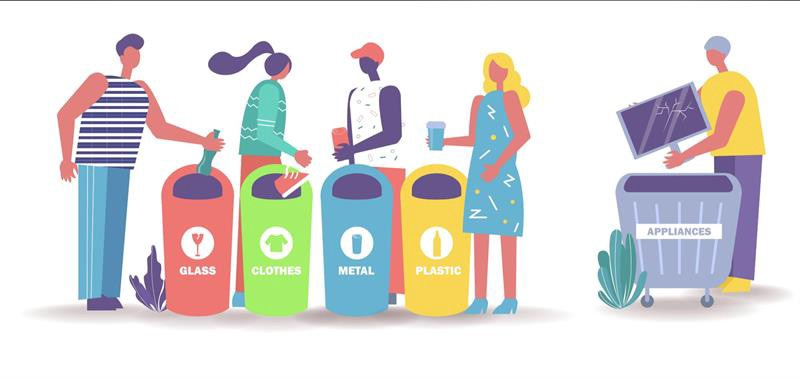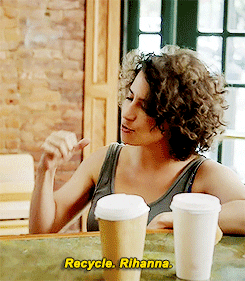Reduce, Reuse, Recycle, Reinvest ♻️

Welcome to Better Your Bread v11, hope you are all having the best Summer that you can given the circumstances. It is already August, Corona has been wreaking havoc in the US (and worldwide) now for 5 straight months and life has changed quite a bit. As many of us are forced to make significant changes — some have moved cities, canceled their leases, changed career paths, and adjusted to the work from home life — it is clear we won’t be back to the same normal we had before. For many causes — the resurgence for Black Lives, the push for racial equity, the drive for pay equity and LGBTQ+ rights — this is a great reset. We have the opportunity to sit at home, reflect, and understand what the hell needs to change in this country. To that regard, please register to vote, let your voice be heard, and don’t just repost pictures on Instagram. If you actually want to make change, do something tangible. And wear your mask… As Cousin Greg puts it — mask on, mask on, mask on, mask on:
Being real though, the COVID-19 death toll is over 160,000 in the United States. Over 60,000 more deaths than any other country, the next being Brazil. It’s insane. Any sense of normalcy that we knew before won’t be returning for a while — if ever — and that is tough to grasp for me. Living in New York City the past four years, I was back a few weeks ago only to find the streets sparse with people, cars, and action. It hurts my heart to see New York without its edge. As I debate the next move — how will life be different? We can move to any city but what factors should be considered? COVID-19 has us craving the outdoors, fitness, or any sense of community while being socially distanced. The future is entirely uncertain which makes things hard… for me, for my siblings just out of college, for family friends late in their careers who recently lost jobs. What is certain? It’s certain that we can adapt… we can find connection online, we can find fitness indoors, we can do business over video chat, we can attend conferences virtually. The new normal is weird, yes, but we can’t keep hoping for the past. Google just announced their 200,000 employees will be remote until July 2021 this week… I have clients who have canceled their office leases permanently and have gone remote entirely. It is time to embrace change.
Living back home where I grew up for the past 5 months coupled with starting a new job hasn’t been easy, but it has surfaced some funny aspects of home life I had forgotten. One of the main ones being how much of recycling fanatic my Mom is. Anyone that has been to my house, they know my mother is a recycling QUEEN and is likely the main driver why I am so against single use plastic, an advocate for recycling, and for minimizing waste as much as I can. From ripping the tops off of pizza boxes (those are recyclable — no food on them) to tipping our recycling service when our bins are full, she definitely does her part to try and limit the waste going into landfills.
Corona has affected us in many ways but one noticeable way the world has been affected is the increase of single-use plastic for sanitary purposes. This week we will be evaluating how you can reduce your use of single use plastic and support companies that are making commitments to recycling their solid waste in the most efficient manner.
As always, I want to link to last week’s post of BYB that makes the case for Blockchain and how it can be used to increase transparency, accountability, and trust in a time when companies need to. Find all my other blog posts here for context. Once again, the goal of the blog is to better your bread ($) and make your money materially important. Feel free to subscribe to the blog via email at the bottom of this post and as always, make sure to shoot me an email anytime with any questions at cmahoney@justcapital.com, connect with me on LinkedIn, reach out on Twitter @iCharlieMahoney, and follow me on Medium (Charlie Mahoney). Beyond happy to help.
An estimated 8 million tons of plastic waste is being dumped in the world’s oceans each year, and we are all responsible. First, let’s start by acknowledging how much progress we were making in eliminating and reducing our use of single-use plastic. Starbucks committed to no plastic straws in their stores by 2022, Unilever pledged that all of its plastic packaging is reusable, recyclable or compostable by 2025, Evian made the pledge to only produce bottles which are 100 percent recycled by 2025. These are all nice commitments and big steps in the right direction, but the real winner is the reusable model.

COVID-19 is really causing problems with plastic. To curb the transmission of COVID-19, bars are serving drinks in plastic cups, plexiglass has been installed in every store you go, and and offices are adding plastic coverings to everything from doorknobs to elevator buttons. Coronavirus is skyrocketing the sales for plastic makers as companies try to maintain hygienic practices in their stores. Even Starbucks and Dunkin Donuts both suspended their refills of reusable cups in March, citing health concerns. Just Salad, a health food chain, was producing reusable bowls that saved more than 75,000 pounds of plastic a year. When the pandemic hit the chain, the company immediately suspended the program and pivoted to delivery and pickup — both of which meant using only disposable packaging. Disposables are on the rise again and most of it is not easy to recycle. From the Wall Street Journal,
“Plastic bags, wraps and pouches are typically difficult for recycling equipment to identify, separate and melt because they are made from multiple types of plastic, or plastic mixed with other materials. Most flexible packaging made from a single plastic — like polyethylene bags — also isn’t recycled because it needs to be collected separately to prevent machines from mistaking it for paper. Despite this, U.S. demand for flexible packaging — most of which is plastic — is forecast to jump by 10% this year, compared with 3% last year, according to research firm Wood Mackenzie. In Europe, growth is estimated to hit over 5% compared with 1.5% last year.”
As we try to stay safe while limiting our use of plastic and resources in order to curb pollution, there are a number of small efforts we can take to do our part in this time. An easy one is to opt out of plastic utensils on pickup and delivery orders… Just Salad implemented the change to its own online-ordering platform around the start of lockdowns, reducing utensil use on all orders by 88%. People do want to make a difference, we simply must make it known to the companies we work for and buy from.
To that point, looking at the 922 companies we cover at JUST Capital, only 222 have disclosed both the total amount of waste produced and recycled within a given year and we’ve found that, of the total waste produced by those companies, only about 53% is recycled. These corporations — the largest in the United States — are producing a tremendous amount of waste, and the way it is managed and disposed will critically impact the future of our planet. We need to reduce our consumption and push our companies to think longer term. Some horrifying facts about plastic:
Experts believe that only 9% of all plastic is recycled
Most humans ingest enough plastic to make a credit card every single week. We don’t fully understand how these microplastics can cause harm to our bodies, but initial studies show that they are toxic to our livers.
According to a recent report, the production and incineration of plastic in 2019 will produce more than 850 million metric tons of greenhouse gases, equal to the emissions of 189 five-hundred-megawatt coal plants
For more info, here are the biggest plastic producers of 2019.
What can we do?
What we can do is limit plastic use wherever we can, commit to zero waste through reusable items, take your efforts locally to clean up beaches and #trashtag it. Even further, we can push our companies to commit to carbon neutrality, zero waste, and set goals to become more sustainable. Then, hopefully, we don’t have to eat a credit card worth of plastic every week in our food.
Of course, there are some companies doing great work on changing the way they operate to better their waste practices. Investing in these companies and ETFs that minimize waste and focus on the environment is critical as well. Incentivizing companies who actively are trying to change their waste management efforts and withholding money from those who don’t is the best way — coupled with our individual practices — to show companies what matters to you. Diving into this week’s ⚡ Shock Stocks ⚡.
⚡Shock Stocks⚡
👍 Accenture (Ticker: ACT)
Diverted almost all of the company’s electronic waste (approximately 423 metric tons) from landfills in 2019.
Committed to 100% renewable energy by 2023, currently at 26% as of 2019.
👎 Coca-Cola(Ticker: KO)
Coca-Cola has been named the world’s largest polluter of plastics for the second year in a row, according to an audit conducted by Break Free From Plastic. The environmental justice group asked 72,541 volunteers in 51 countries to collect plastic waste. Almost half (43%) of what they found were clearly marked consumer brands. Coca-Cola was named the world’s number one global plastic polluter
They aim to make their global packaging 100% recyclable by 2025 but we can push them to do more
Plastic-free ETF ♻️
If you are aiming to invest in an ETF that captures the market exposure of the S&P 500 but excludes any stocks whose activities are incompatible with a vegan and climate-conscious approach to investing, you may want to take a look at the US Vegan Climate ETF (Ticker: VEGN).
The fund avoids investing in companies whose business models rely on animal exploitation — predominantly testing and animal-derived products — as well as removing fossil fuel and environmental threats such as plastic and agrochemicals, which are harmful to wild animals. The fund just launched in Sept 2019 and is one of the more unique offerings out there. Website here.
That’s it for this week, enjoy your weekend ✌️ !
Make sure to sign up for all future posts to be sent to your email here:
Disclaimer: I aim to provide accurate information on personal finance and investing, but it may not apply directly to your individual situation. I am not a financial advisor and we recommend you consult with a financial professional before making any serious financial decisions. The content on Better Your Bread is informational and educational purposes, thank you!

